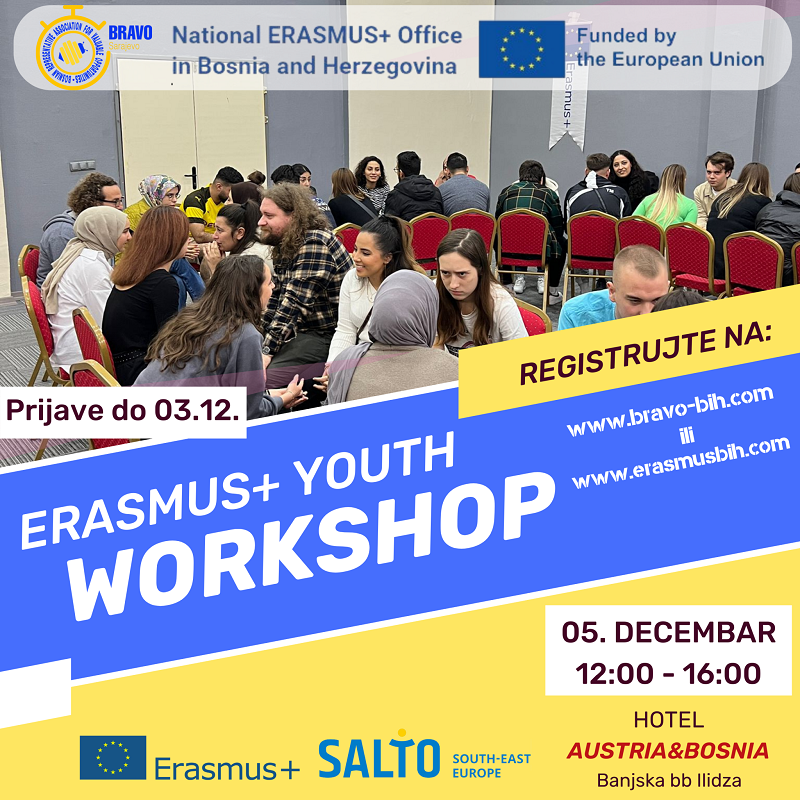AKCIJE
Erasmus + provides grants for a wide range of actions and activities
The programme gives opportunities to students, trainees, staff and volunteers to spend a period abroad to increase their skills and employability.

Key Action 1: Learning Mobility of Individuals
Key Action 1 supports mobility in the education, training and youth sectors and aims to bring long lasting benefits to the participants and the participating organisations involved.

Key Action 2: Cooperation for innovation and the exchange of good practices
The actions under Key Action 2 make it possible for organisations from different participating countries to work together, to develop, share and transfer best practices and innovative approaches in the fields of education, training and youth.

Key Action 3: Support for policy reforms
Key Action 3 provides grants for a wide variety of actions aimed at stimulating innovative policy development, policy dialogue and implementation, and the exchange of knowledge in the fields of education, training and youth.

Jean Monnet
Within the new Erasmus+ Programme, the Jean Monnet Actions aim at promoting excellence in teaching and research in the field of European Union studies worldwide.
Online info session: Capacity Building in the field of Youth (CBY) 2023 on 12 December 2022 from 10:00 to 12:00 CET
Please follow the details and find registration link on this WEBSITE.
Online Info session: Erasmus+ Sport 2023 on 30 January 2023, 09:30 - 18:30 CET
Please follow the details and find registration link on this WEBSITE
All upcoming events you can find on EACEA Events site: https://www.eacea.ec.europa.eu/news-events/events_en
 Radionica ima za cilj prezentaciju Erasmus+ programa i praktičnu obuku učesnika kako postati dio najvećeg europskog programa koji podržavaju edukaciju, treninge, mlade ljude i sport širom Europe.
Radionica ima za cilj prezentaciju Erasmus+ programa i praktičnu obuku učesnika kako postati dio najvećeg europskog programa koji podržavaju edukaciju, treninge, mlade ljude i sport širom Europe.
Nacionalna Erasmus+ kancelarija u Bosni i Hercegovini i kontakt tačka za Erasmus+ Youth Asocijacija BRAVO vas pozivaju na Erasmus+ Info/Workshop dan, 05. decembra 2022. Godine, od 12:00 do 16:00, u Austria&Bosnia hotelu na Ilidži (Banjska bb). Erasmus+ je EU-ov program kojim se podupiru obrazovanje, osposobljavanje, mladi i sport u Europi. Njegov budžet iznosi oko 26,2 milijarde eura. Program za razdoblje 2021. – 2027. izrazito je usmjeren na socijalnu uključenost, zelenu i digitalnu tranziciju te promicanje sudjelovanja mladih u demokratskom životu.
Podupire prioritete i aktivnosti u okviru europskog prostora obrazovanja, Akcijskog plana za digitalno obrazovanje i Programa vještina za Europu. Taj program također podupire europski stup socijalnih prava, služi za provedbu strategije EU-a za mlade za razdoblje 2019. – 2027., te razvija europsku dimenziju u sportu
Erasmus+ nudi mogućnosti za mobilnost i suradnju za:
- visoko obrazovanje
- strukovno obrazovanje i osposobljavanje
- školsko obrazovanje (uključujući rani i predškolski odgoj i obrazovanje)
- obrazovanje odraslih
- mlade i
- sport.
Detaljne informacije o svim mogućnostima, uključujući sve kriterije, dostupne su u Erasmus+ Programskom Vodiču.
Informacije o rezultatima programa Erasmus+ dostupne su na platformi projekata programa Erasmus+.
To uključuje većinu inicijativa financiranih u okviru programa te odabrane primjere dobre prakse i priče o uspjehu.
We are pleased to announce the launch of the new Erasmus+ Programme Guide 2023
The Erasmus+ Programme Guide is essential to understanding Erasmus+. It provides participating organisations and individuals a comprehensive list of opportunities supported by the programme.
Stay tuned for more information on new Erasmus+ Calls for Proposals.




